Roles and Characteristics of Managers and Leaders
21 Pages6068 Words79 Views
Added on 2023-01-16
About This Document
This document discusses the roles and characteristics of managers and leaders in an organization, specifically focusing on TESCO. It explores the different functions and responsibilities of managers and leaders in different situational contexts. The document also elaborates on various leadership theories and their applications in operations management. Additionally, it highlights the importance of operations management for achieving business objectives.
Roles and Characteristics of Managers and Leaders
Added on 2023-01-16
ShareRelated Documents
Management and
Operations
Operations
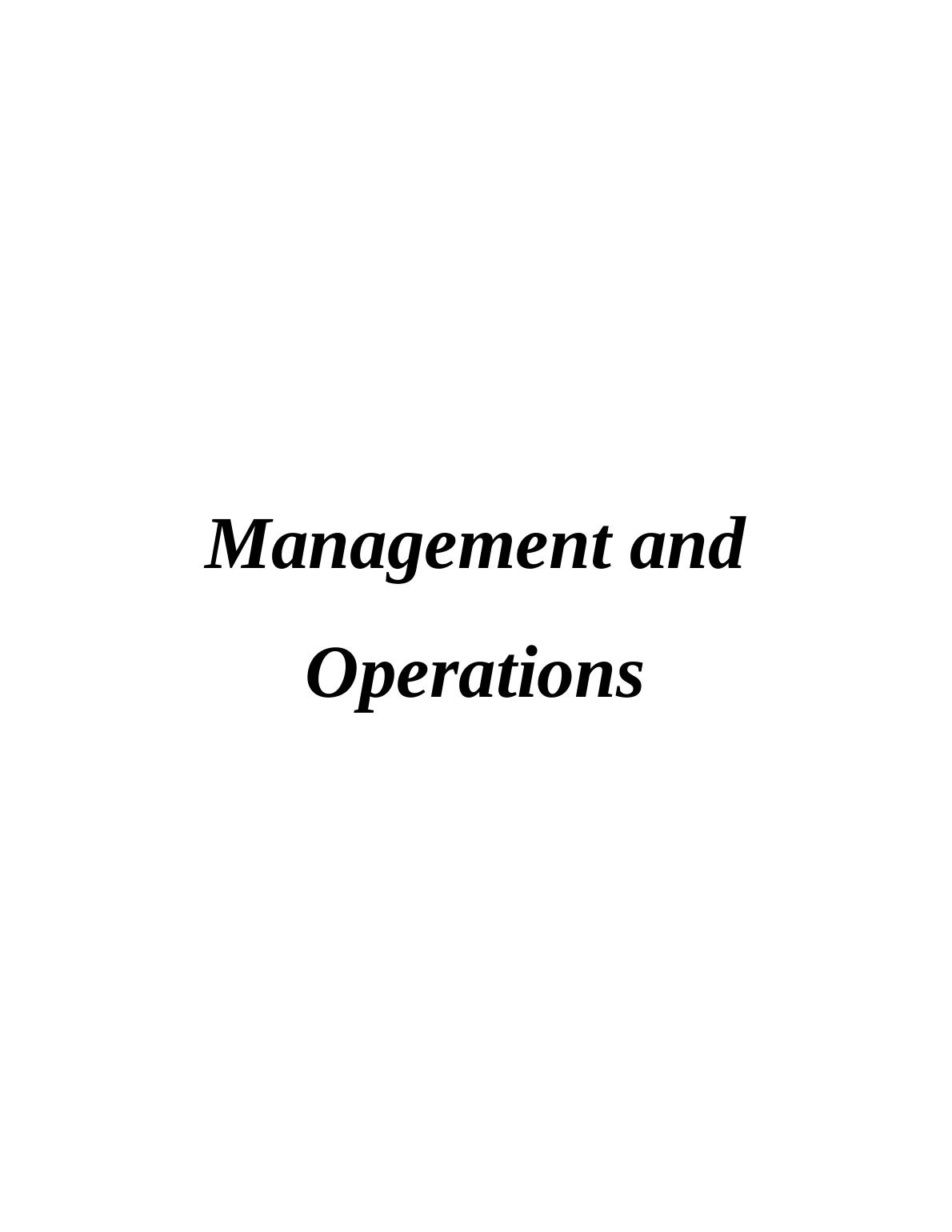
Table of Contents
INTRODUCTION ..........................................................................................................................3
TASK 1............................................................................................................................................3
P1 Roles and characteristics of managers and leaders.................................................................3
TASK 2............................................................................................................................................6
P2 Evaluation of role of leaders and functions of in different situational context......................6
P3 Application of different leadership theories ..........................................................................8
TASK 3..........................................................................................................................................12
P4 Key approaches of operations management and role of leaders and managers...................12
P5 Importance of operations management for achieving business objectives...........................15
TASK 4..........................................................................................................................................16
P6 Factors affecting operations management and decisions of leaders and manages...............16
CONCLUSION..............................................................................................................................18
REFERENCES..............................................................................................................................19
INTRODUCTION ..........................................................................................................................3
TASK 1............................................................................................................................................3
P1 Roles and characteristics of managers and leaders.................................................................3
TASK 2............................................................................................................................................6
P2 Evaluation of role of leaders and functions of in different situational context......................6
P3 Application of different leadership theories ..........................................................................8
TASK 3..........................................................................................................................................12
P4 Key approaches of operations management and role of leaders and managers...................12
P5 Importance of operations management for achieving business objectives...........................15
TASK 4..........................................................................................................................................16
P6 Factors affecting operations management and decisions of leaders and manages...............16
CONCLUSION..............................................................................................................................18
REFERENCES..............................................................................................................................19
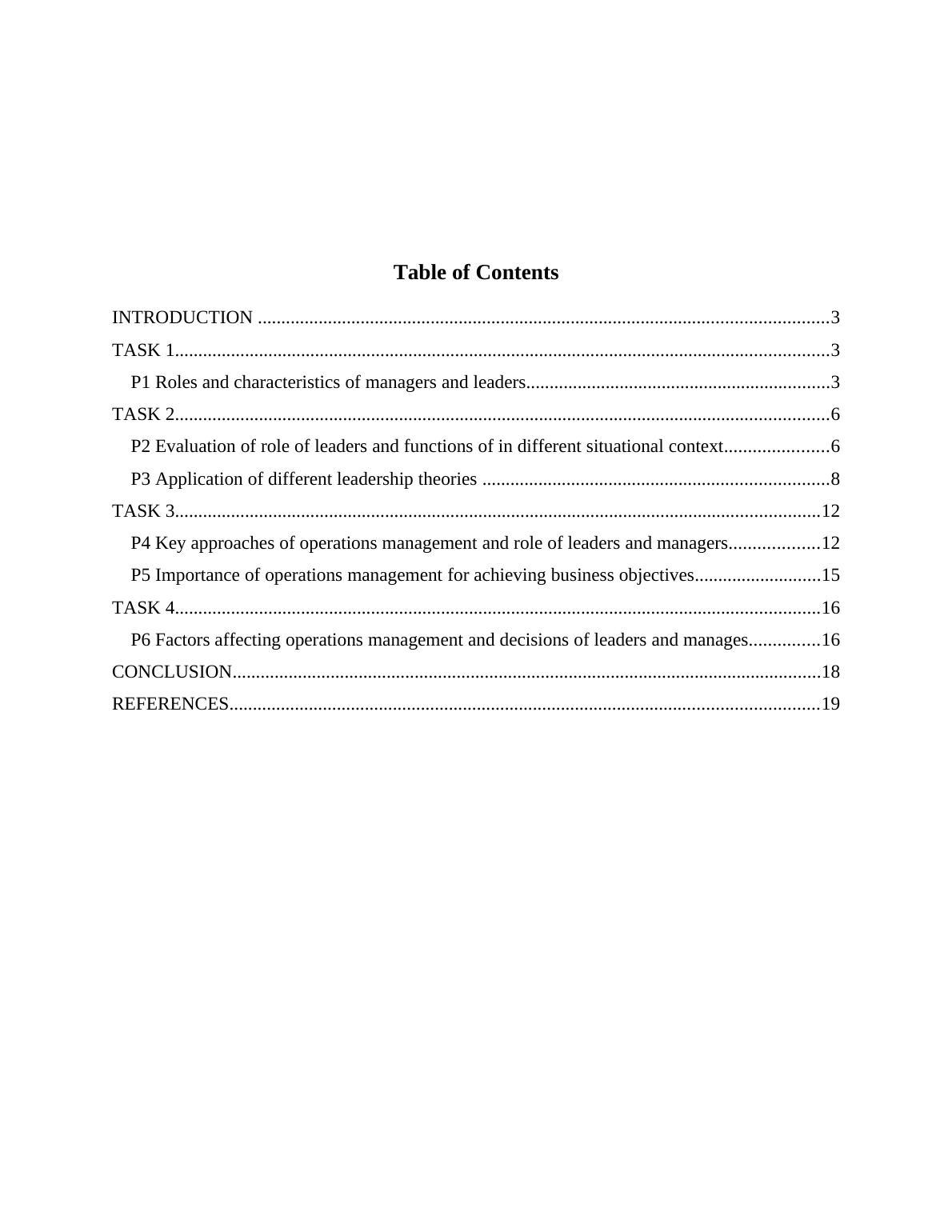
INTRODUCTION
Management is a process which helps an organisation to manage their operational activities and
perform their actions in an appropriate manner. Management is an essential procedure which is
required at all levels and in all type of organisation either profit or non-profit. Operational
actions include manufacturing logistics supply chain management and distribution of activities.
Management operation is a system of business which helps in creating and maintaining the
efficiency of an organisation and its processes. For this report an organisation which is chosen
for studying different aspects of operational management and different leadership style is
TESCO . It is a British multinational organisation which deals in grocery industry. The company
is headquartered in England UK. In this assignment different roles and characteristics of leaders
and managers are discussed in context of TESCO . Also so different it roles and functions of
managers are studied which applies in different situations which company face. Several theories
and approaches are also elaborated to see their application in several situations which managers
of TESCO deals with every time. All these different theories and approaches of operation
management study to know their importance in obtaining the business objectives.
TASK 1
P1 Roles and characteristics of managers and leaders
Managers the individual who manage to work in an organisation with define goals and
objectives. Managers make strategies and plans in order to attain the success and growth of
company and guide their employees in an effective manner towards the goal of the organisation
(Neelakandan, Tyagi and Nagalkar, 2019). Every organisation has different levels and
departments and for each functional unit a manager is assigned performing different task and
managing all the employees. Managers also perform employee appraisal activities and
managerial functions. They have the power to recruit staff manage them monitor their actions
and even fire them if personal are not working in an appropriate manner.
Roles of manager Monitoring- Manager seek and receive information from different sources which are ex-
ternal and internal to gain understanding of organization and its environment. This is the
role of managers to monitor the staff and teammates in order to ensure that personal are
working in effective manner to attain organizational objectives.
Management is a process which helps an organisation to manage their operational activities and
perform their actions in an appropriate manner. Management is an essential procedure which is
required at all levels and in all type of organisation either profit or non-profit. Operational
actions include manufacturing logistics supply chain management and distribution of activities.
Management operation is a system of business which helps in creating and maintaining the
efficiency of an organisation and its processes. For this report an organisation which is chosen
for studying different aspects of operational management and different leadership style is
TESCO . It is a British multinational organisation which deals in grocery industry. The company
is headquartered in England UK. In this assignment different roles and characteristics of leaders
and managers are discussed in context of TESCO . Also so different it roles and functions of
managers are studied which applies in different situations which company face. Several theories
and approaches are also elaborated to see their application in several situations which managers
of TESCO deals with every time. All these different theories and approaches of operation
management study to know their importance in obtaining the business objectives.
TASK 1
P1 Roles and characteristics of managers and leaders
Managers the individual who manage to work in an organisation with define goals and
objectives. Managers make strategies and plans in order to attain the success and growth of
company and guide their employees in an effective manner towards the goal of the organisation
(Neelakandan, Tyagi and Nagalkar, 2019). Every organisation has different levels and
departments and for each functional unit a manager is assigned performing different task and
managing all the employees. Managers also perform employee appraisal activities and
managerial functions. They have the power to recruit staff manage them monitor their actions
and even fire them if personal are not working in an appropriate manner.
Roles of manager Monitoring- Manager seek and receive information from different sources which are ex-
ternal and internal to gain understanding of organization and its environment. This is the
role of managers to monitor the staff and teammates in order to ensure that personal are
working in effective manner to attain organizational objectives.
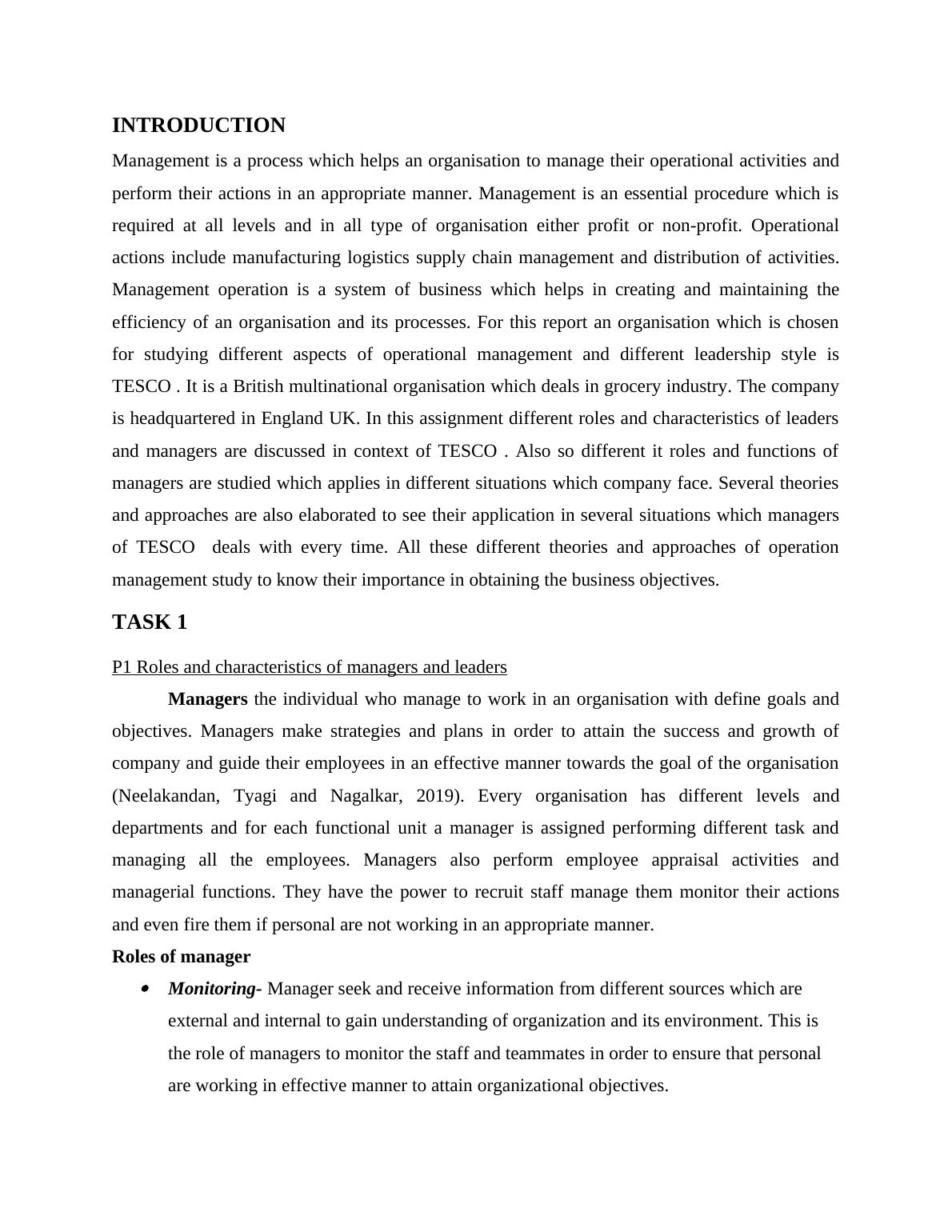
Spokesman- Managers at as a spokesman for their personals or subordinates working un-
der them. The deals with people outside the organization and even other parties of organi-
zation which are not part of the team (Merigó and Yang, J. B, 2017). In other words man-
agers act as a representative of their subordinates and convey messages on behalf of their
staff to outside parties for to higher level management.
Characteristics of managers
Risk avoiders- Managers are risk avoiders, they plants and development strategies in or-
der to manage the organization. Managers do not take more risk they are risk avoiders by
nature.
Leaders are the individuals who get their work done through their employees or
subordinates by assigning them task and duties according to their expertise and in relation with
objectives of the company (Meredith and Shafer, 2019). Leaders play a very important role in in
organisation for motivating the employees by using different leadership styles and making them
work in order to attain organisational goals. Therefore a leader’s role is to inspire the staff with
aim of increasing productivity of their organisation.
Roles of leaders Motivator- As managers its duty to motivate and encourage the team Tum towards the
aims and objectives of organization. They also work as coordinator between staff and top
level management interacting with other parties on behalf of their team and personals
working under them.
Negotiator- Leaders please the role of negotiator and represent the company in external
environment. Leaders communicate with external parties on behalf of company and con-
vey all the information which is necessary for organization to deliver it to outer world
and all external parties.
Characteristics of leaders Risk takers- Leaders are the individuals who are always ready to take risk as they have
competence on behalf of company. They have all the required knowledge of business en-
vironment for making effective decisions antiquing reasonable risk for obtaining objec-
tives of company (Martin and et. al., 2017).
der them. The deals with people outside the organization and even other parties of organi-
zation which are not part of the team (Merigó and Yang, J. B, 2017). In other words man-
agers act as a representative of their subordinates and convey messages on behalf of their
staff to outside parties for to higher level management.
Characteristics of managers
Risk avoiders- Managers are risk avoiders, they plants and development strategies in or-
der to manage the organization. Managers do not take more risk they are risk avoiders by
nature.
Leaders are the individuals who get their work done through their employees or
subordinates by assigning them task and duties according to their expertise and in relation with
objectives of the company (Meredith and Shafer, 2019). Leaders play a very important role in in
organisation for motivating the employees by using different leadership styles and making them
work in order to attain organisational goals. Therefore a leader’s role is to inspire the staff with
aim of increasing productivity of their organisation.
Roles of leaders Motivator- As managers its duty to motivate and encourage the team Tum towards the
aims and objectives of organization. They also work as coordinator between staff and top
level management interacting with other parties on behalf of their team and personals
working under them.
Negotiator- Leaders please the role of negotiator and represent the company in external
environment. Leaders communicate with external parties on behalf of company and con-
vey all the information which is necessary for organization to deliver it to outer world
and all external parties.
Characteristics of leaders Risk takers- Leaders are the individuals who are always ready to take risk as they have
competence on behalf of company. They have all the required knowledge of business en-
vironment for making effective decisions antiquing reasonable risk for obtaining objec-
tives of company (Martin and et. al., 2017).
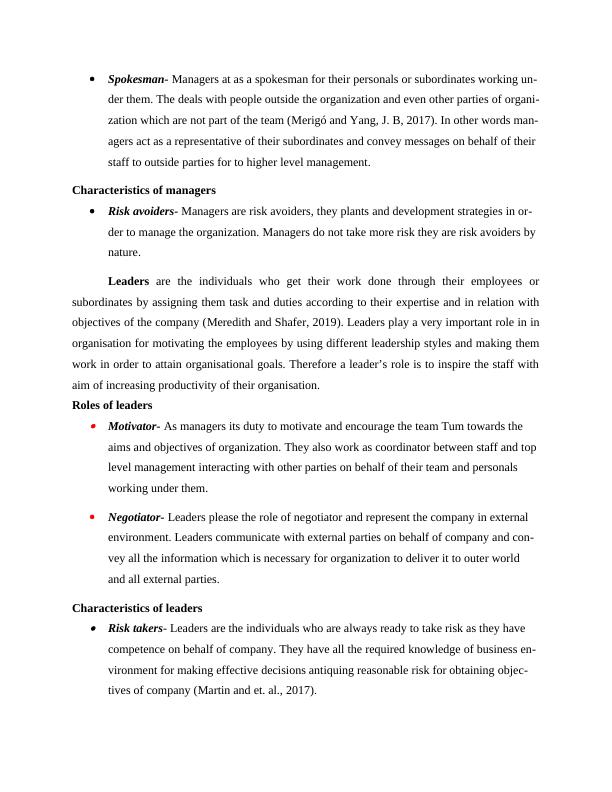
Change agent- Leaders are those which implement change in an organization they moti-
vate that subordinates to accept new things or processes and work accordingly. Change is
very essential to take place in all organization as many benefits and works are related to
its which enables entity to work in more productive manner and achieve all objectives of
organization.
Comparison between role of leaders and managers on basis of their roles and characteris-
tics
Basis Leaders Managers
Negotiator/
Spokesman
The leaders represent the company
in marketplace and works as a
negotiator for TESCO. The leaders
present the organisation in front of
other parties and mainly in front of
stakeholders.
On the other hand the managers
plays the role of spokesman for
the employees representing them
in front of other departments and
top management staff.
Risk seeker/
Risk avoider
The leaders are the risk seekers
holding this characteristic in their
nature. Their attitude is positive and
they use it while making strategic
plans for TESCO for conducting all
operations effectively.
The managers are risk avoiders
they make plans for conducting
different actions but they avoid
any kind off risks. They rather
search and find ways to perform
those activities with more safety.
Vision/ Goals Leaders work with creativity and
innovation, which describes their
role of developing vision for
performing any task.
Managers are risk avoiders, they
stick to what works and refines
structure, systems and processes
for making them better. They set
organisational goals by
processing its systems and
making them better.
Long/ short term
thinking
Leaders are innovator, they find
unique ways of performing jobs and
On the contrary, managers vision
is for shorter period they make
vate that subordinates to accept new things or processes and work accordingly. Change is
very essential to take place in all organization as many benefits and works are related to
its which enables entity to work in more productive manner and achieve all objectives of
organization.
Comparison between role of leaders and managers on basis of their roles and characteris-
tics
Basis Leaders Managers
Negotiator/
Spokesman
The leaders represent the company
in marketplace and works as a
negotiator for TESCO. The leaders
present the organisation in front of
other parties and mainly in front of
stakeholders.
On the other hand the managers
plays the role of spokesman for
the employees representing them
in front of other departments and
top management staff.
Risk seeker/
Risk avoider
The leaders are the risk seekers
holding this characteristic in their
nature. Their attitude is positive and
they use it while making strategic
plans for TESCO for conducting all
operations effectively.
The managers are risk avoiders
they make plans for conducting
different actions but they avoid
any kind off risks. They rather
search and find ways to perform
those activities with more safety.
Vision/ Goals Leaders work with creativity and
innovation, which describes their
role of developing vision for
performing any task.
Managers are risk avoiders, they
stick to what works and refines
structure, systems and processes
for making them better. They set
organisational goals by
processing its systems and
making them better.
Long/ short term
thinking
Leaders are innovator, they find
unique ways of performing jobs and
On the contrary, managers vision
is for shorter period they make
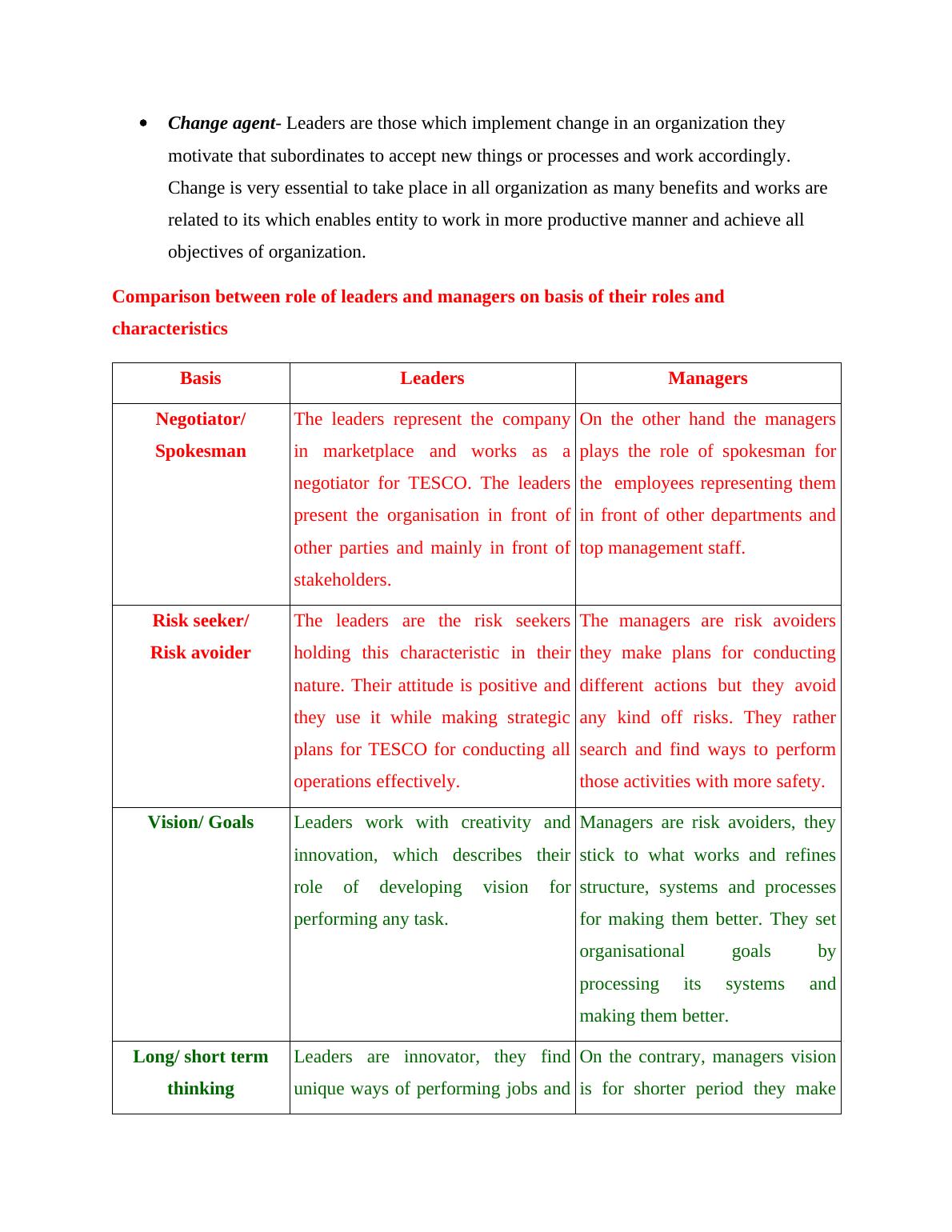
they set their vision considering
longer period or time duration.
plan for attaining short-term
objectives.
From the above comparison, it is described that leaders take risk for the success and
growth of company but managers are risk avoiders because they only maintain and manages
work in an organisation. Meanwhile leaders are risk taker because they are the developer as they
develop and innovate things within an organisation. In addition to this, managers does things in
right manner but leaders does right things for the betterment of an organisation. So, both leaders
and managers plays an important role in organisation and both are different as managers are
necessary to have meanwhile, leaders are essential.
TASK 2
P2 Evaluation of role of leaders and functions of in different situational context
Managers and leaders make an organisation to work in order to accomplish the desired
goals and fulfil the objectives of an organisation. There are several approaches and techniques
which helps managers in functioning all managerial activities effectively. Both managers and
leaders place different roles in company performing unique functions for organisation so that all
goals and objectives of entity can be achieved (Slack, 2018). There are several theories which are
applied with functions of managers and roles of leaders for making the company a success by
way of effective operations and business activities. The operational team of TESCO can make
use of these theories of Management by uniting the effort of leaders and managers and raising
the productivity of company. Some of these theories elaborated in the next section in context of
TESCO and its managers.
Situation I
Product launch: According to this, situation company develop many changes within an
organisation which exist in business environment. For this, TESCO need to make continuous
changes and modifications in its products and services which develop competition in market and
because of this, company offer new products to satisfy their respective customers and also attract
new ones.
Role of a Leader: By considering the first situation, leader should adopt transformational
leadership because it is related with inspiring and motivating employees and also helpful in
longer period or time duration.
plan for attaining short-term
objectives.
From the above comparison, it is described that leaders take risk for the success and
growth of company but managers are risk avoiders because they only maintain and manages
work in an organisation. Meanwhile leaders are risk taker because they are the developer as they
develop and innovate things within an organisation. In addition to this, managers does things in
right manner but leaders does right things for the betterment of an organisation. So, both leaders
and managers plays an important role in organisation and both are different as managers are
necessary to have meanwhile, leaders are essential.
TASK 2
P2 Evaluation of role of leaders and functions of in different situational context
Managers and leaders make an organisation to work in order to accomplish the desired
goals and fulfil the objectives of an organisation. There are several approaches and techniques
which helps managers in functioning all managerial activities effectively. Both managers and
leaders place different roles in company performing unique functions for organisation so that all
goals and objectives of entity can be achieved (Slack, 2018). There are several theories which are
applied with functions of managers and roles of leaders for making the company a success by
way of effective operations and business activities. The operational team of TESCO can make
use of these theories of Management by uniting the effort of leaders and managers and raising
the productivity of company. Some of these theories elaborated in the next section in context of
TESCO and its managers.
Situation I
Product launch: According to this, situation company develop many changes within an
organisation which exist in business environment. For this, TESCO need to make continuous
changes and modifications in its products and services which develop competition in market and
because of this, company offer new products to satisfy their respective customers and also attract
new ones.
Role of a Leader: By considering the first situation, leader should adopt transformational
leadership because it is related with inspiring and motivating employees and also helpful in
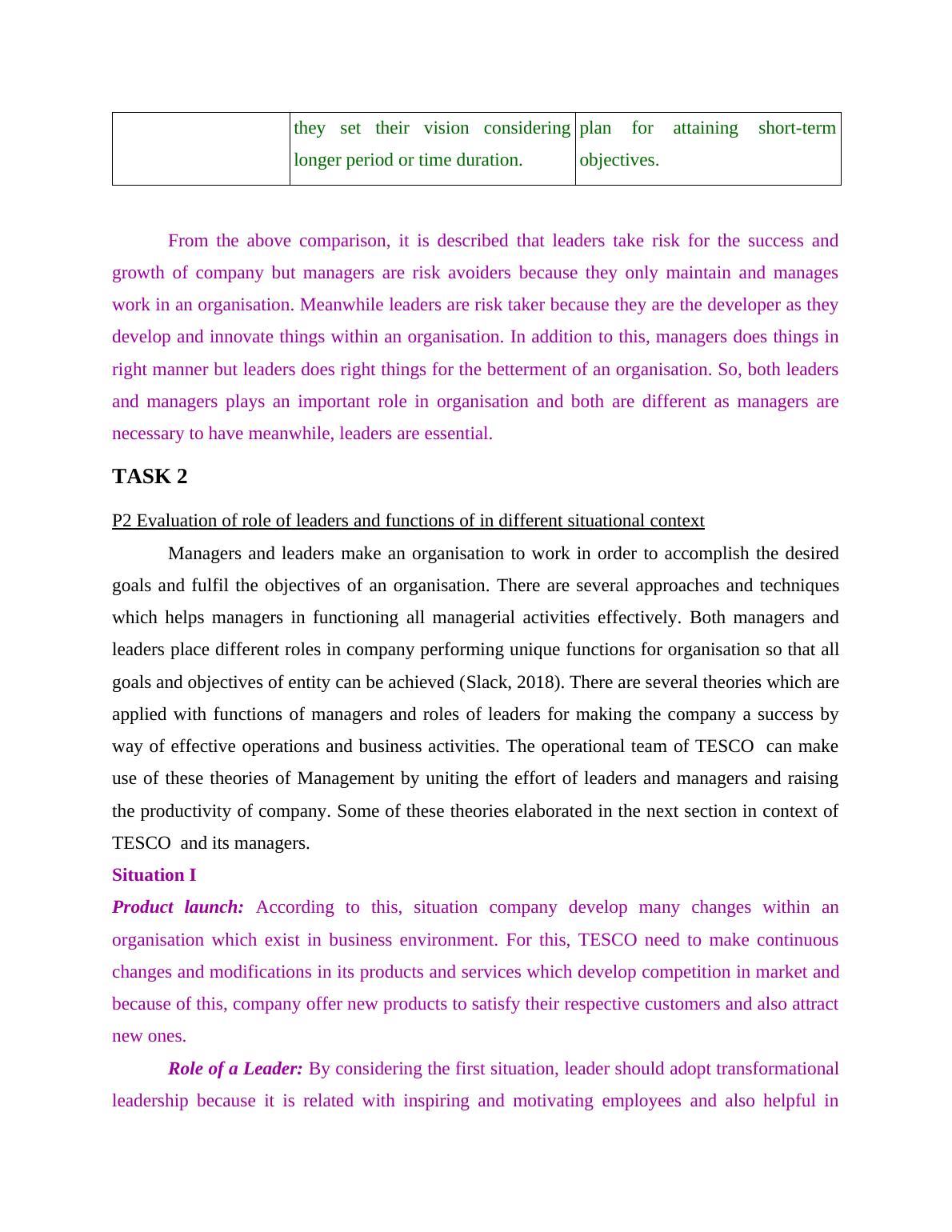
End of preview
Want to access all the pages? Upload your documents or become a member.
Related Documents
Management and Operationslg...
|13
|3858
|75
Uber Management and Operationlg...
|11
|3226
|269
Roles and Characteristics of a Leader and a Managerlg...
|17
|4577
|39
P1 Different Roles And Characteristics Of A Leader And A Managerlg...
|16
|5409
|410
Management & Operations.lg...
|19
|4941
|78
Roles and Characteristics of Leaders and Managers in Operations Managementlg...
|19
|4617
|99
